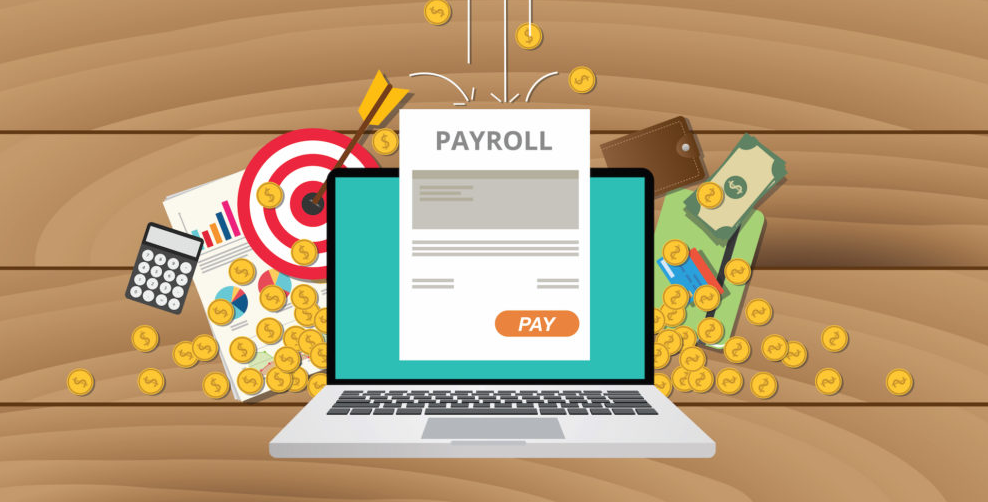Payroll is all compensation that a business must pay to its employees for a set period of time or on a specified date. It is usually managed by the accounting or human resources department of a business; Small-business payroll can be directly controlled by the owner or an affiliate.
Payroll can also refer to the list of employees of a business and the amount of compensation due to each of them. This is a major expense for most businesses and is almost always deductible, which means that the company’s taxable income can be deducted from the gross income that reduces it. Payroll can vary from one pay period to another due to overtime, sick pay, and other variables.
Understanding Payroll
Payroll is the process of paying employees of a company, which may include tracking of hours worked, calculating an employee’s salary, and disbursing payments through direct checks directly to their account. However, companies must do accounting work to record payroll, withdrawal of taxes, bonuses, overtime pay, sick time, and vacation pay. Companies also have to put aside and the government will have to record any amount paid for Medicare, Social Security, and unemployment taxes.
Payroll is all compensation that a business must pay to its employees for a set period of time or on a specified date.
The payroll process may include tracking hours worked for employees, calculating salaries, and disbursing payments via direct deposit or check.
However, companies should set aside separate amounts of accounting for Medicare, Social Security, and unemployment taxes, as well as record-keeping.
The employer monitors the number of hours worked by each employee and relays this information to the payroll service. When the time of releasing payment of employee, the payroll software calculates the amount of the employee based on total work hours of the month. This software also works as an attendance management system. The service deducts taxes and other withholdings from earnings and then pays employees.
Features of Payroll Software
This can save time for both the accounting department and the HR team as it can handle all payroll details automatically. This avoids the risk of having the necessary data in the wrong file and miss calls. For example, even a small mistake of placing a “0” or decimal can cause huge damage to the organization. A payroll system can save time and ensure accuracy. It also protects the organization from penalties as it complies with all regulatory guidelines. We have mentioned most of the features of Payroll software below:
Reporting
You can handle the following reporting tasks and customize the report criteria with software –
- Audit report
- Timesheet report
- Unemployment wages
- The report related to liability and salary audit
- Output formats and reports such as XML, email, printed reports and text files
- Form 941, W-3, 1096, and W-2
The software can also allocate resources to limited people because different teams handle different reports. Therefore, this software is cable for making the most of reporting. Ensure that important reporting features are provided before purchasing the software. Now you can ditch files, pens, emails, and spreadsheets as payroll software can do all this.
Payslips and Recording Files
The software can generate reports such as salary benefits, vacation summaries and salary statements. You can print peplat from its digital platform. It also has options to print and download forms such as Form 16, Form 12C and Form 12BA. This software handles all employees’ documents and records. Features like employee profile, experience sheet, organizational chart, offer letter, and business tax and security have been added to it.
Management Earnings
Payroll software manages employee earnings with the following elements –
- Allocation rule
- Calculation rule
- Basic Pay and Premium Pay
- Tax earning
- FLSA overtime pay
- Earning department on work performance or bonus tips
- Earning code
Advantages and disadvantages of using professional payroll services
Professional payroll services provide many benefits and some disadvantages. A major benefit of payroll services is the ability to produce a wide variety of reports that simplify accounting procedures and help companies ensure that they are in compliance with legal and tax filing requirements. The payroll service can also keep a record of how much leisure or personal time employees have used.
On the downside, when companies outsource their payroll systems, they must rely on individuals from outside the business for accurate accounting. In the event of an error, the company’s on-site personnel must deal with troubled employees. Companies may also face tax penalties for payroll service errors. In addition, payroll services are more expensive than running payroll in the home. Services may charge a fixed monthly fee or offer different payment structures for different levels of service. For the small companies, the payroll service is not good as there are few employees there no meaning of using payroll software.
Payroll software program
In lieu of using specialized payroll services, some companies choose to rely on payroll software programs. Once the company purchases the software, there is no additional monthly fee. Software programs typically include printable tax forms and withholding tables. In addition to financial savings, internal payroll systems help companies keep confidential financial information private. However, software programs can be time-consuming, which can pose a problem for companies with small employees.

My name is Nicolas Thomas. I am Managing Director and Co-Founder of Indian App Developer, leading Software and Mobile App Development Company India. My ideology is that a clear vision and hard work build a great company. I started my career in Information and Technology 10 years back as a new-age Entrepreneur in emerging digital India.




